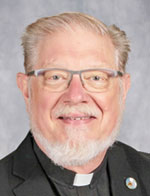That All May Be One / Fr. Rick Ginther
Prayer is integral element in building bridges of faith in ecumenical efforts
 We have come to the end of Lent. We are now in the Easter triduum (the great three days). The triduum concludes with the celebration of Easter, when we can say or sing “Alleluia!”
We have come to the end of Lent. We are now in the Easter triduum (the great three days). The triduum concludes with the celebration of Easter, when we can say or sing “Alleluia!”
For all Christians, Easter is a common celebration and season. This has been true for centuries. As noted in this column last month, however, the date of Easter is not a common one.
Lent among some reformed Christians has not been a part of their worship or seasonal tradition until recently.
In the last 60 years, Lent has taken on a more widespread practice for what some would call “mainline Protestant churches.” This includes the distribution of ashes on Ash Wednesday.
These renewed practices are usually by the first- or second-generation reformation churches. An outlier would be the Episcopal/Anglican and Lutheran communions. They have maintained the majority of Catholic Lenten practices since the 16th century.
The age of ecumenism is in part the cause of this change.
After the Second Vatican Council, Catholics and other Christians began to experience one another in service activities and common prayer.
Many clergy of these congregations began to meet as clergy associations, eating together and planning joint service projects or seasonal prayer services.
As a deacon, priest and pastor, I have experienced such in Tell City, Richmond, Terre Haute and, most recently, Indianapolis.
Our Lady of Lourdes Parish sits within historic Irvington on the city’s east side. For decades, the parish’s pastor has been a part of the Irvington Association of Ministers (IAM). It consists of Episcopalians, the Evangelical Lutheran Church in America, two Disciples of Christ churches and Catholic, Methodist and Presbyterian congregations.
One of IAM’s annual ecumenical efforts is a Lenten soup and bread meal and prayer service.
In recent years, all member churches celebrate their own Ash Wednesday service. The following five Wednesday nights of Lent are the setting for the soup and prayer gatherings.
At an early winter monthly meeting, IAM pastors discuss what theme will guide the five weeks. This year it was “The Holy Within.” Once that is decided, five of the churches offer to host the meal and prayer.
The meal is a Lenten feast of the best soups the congregation members can prepare. It falls short of being a competition, but it surely is delicious!
The prayer is in the tradition of the host church. The presider is usually the pastor, and the preacher is one of the other ministers from another congregation. He or she chooses a Scripture text through which to reflect on the theme. The variety of prayer forms and preaching is uplifting and eye-opening.
The neighboring churches created the Irvington Community Advocacy Network a number of years ago. It is an outreach initiative to assist the hungry, the poor and the homeless.
All congregations support this outreach with monetary, food, clothing and emergency donations. All provide volunteers for the food pantry and the clothes closet. These efforts are overseen by a part-time director. The members also offer support and prayers for the success of the individual congregation’s outreach efforts.
The person of Jesus Christ, his life, death and resurrection; our common trinitarian faith; the Gospel command (Mt 25:31-46) to care for the needy; and our seeking to fulfill the Lord’s longing that “all may be one” (Jn 17:21) impel the member churches in these ecumenical efforts.
Prayer undergirds all that we do together. Prayers offer support to each congregation. It is truly a blessing rooted in the paschal mystery! Alleluia!
(Father Rick Ginther is director of the archdiocesan Office of Ecumenism and Interreligious Affairs. He is also the pastor of Our Lady of Lourdes Parish in Indianapolis.) †
 We have come to the end of Lent. We are now in the Easter triduum (the great three days). The triduum concludes with the celebration of Easter, when we can say or sing “Alleluia!”
We have come to the end of Lent. We are now in the Easter triduum (the great three days). The triduum concludes with the celebration of Easter, when we can say or sing “Alleluia!”